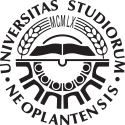15FLFL004 - Helleno-Roman Philosophy
| Course specification | ||||
|---|---|---|---|---|
| Course title | Helleno-Roman Philosophy | |||
| Acronym | 15FLFL004 | |||
| Study programme | Philosophy | |||
| Module | ||||
| Type of study | first degree undergraduate academic studies | |||
| Lecturer (for classes) | ||||
| Lecturer/Associate (for practice) | ||||
| Lecturer/Associate (for OTC) | ||||
| ESPB | 10.0 | Status | ||
| Condition | none | Oblik uslovljenosti | ||
| The goal | Lectures in the subject “Hellenistic-Roman philosophy” should familiarize students with the best thinker of whole ancient philosophy, Aristotle. The intention is, latter, to enplane the causes and the consequences of the fall classic Hellenic polis and to frame Hellenistic-Roman age itself, which will be presented through the plurality of philosophical paradigms, doctrines and schools. A special accent will be on the stoicism, the Epicureanism and the scepticism in all its variety of manifestations as well as Peripatetics, Academics, Eclectics, Neopythagoreans , philosophy of Hebrew-Hellenic provenience, and finally on Plotinus and other Neoplatonists. | |||
| The outcome | Overmaster the basic doctrine, ideas and terms of Hellenistic-Roman philosophy in both, systematic and historic way. | |||
| Contents | ||||
| Contents of lectures | Aristotle and the end of the classic period: Aristotle and the end of the classical period: Aristotle’s systematizations of philosophy; Aristotle’s metaphysics; Aristotle’s philosophy of nature; Aristotle’s anthropology; Aristotle’s psychology; Aristotle’s logics; Aristotle’s practical philosophy; Peripatetic as a scientific/research institution. Hellenic-Roman philosophy: general issues of the Hellenistic-Roman age; Stoic’s logics; Stoic’s cosmology; Stoic’s ethics; A difference between atomistic and epicurean understanding atom; Epicurean ethics; Pyrrhonian critic of the perception and Aenesidemus’ critic of mind; Middle and New Academy; The impact of Cicero on the translating of the philosophical terminology in Latin; Neopythagoreans and new cynicism; Hellenistic-Hebrew synthesis recognized in doctrine of Philonous of Alexandria; Plotinus’ intellection of god ; The term of emanation in the doctrine of Plontinus; Other neoplatonic schools. | |||
| Contents of exercises | Comparative method, analytical method, dialogical method (work on the original fragments and text analysis) | |||
| Literature | ||||
| ||||
| Number of hours per week during the semester/trimester/year | ||||
| Lectures | Exercises | OTC | Study and Research | Other classes |
| 4 | 2 | |||
| Methods of teaching | Comparative method, analytical method, dialogical method (work on the original fragments and text analysis) | |||
| Knowledge score (maximum points 100) | ||||
| Pre obligations | Points | Final exam | Points | |
| Activites during lectures | 5 | Test paper | 20 | |
| Practical lessons | Oral examination | 50 | ||
| Projects | ||||
| Colloquia | 10 | |||
| Seminars | 15 | |||

